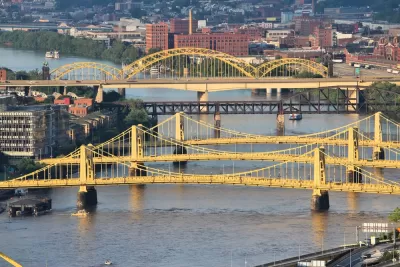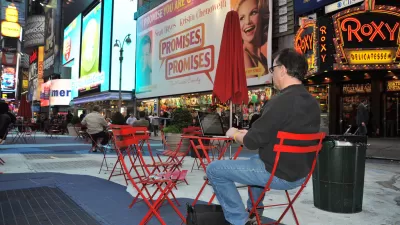Think Columbus, Ohio and Pittsburgh, Pennsylvania.

"It had to happen, but why is it happening now? Secondary tech hubs – outside the orbit of Silicon Valley and New York – are showing undeniable momentum this year," reports Conor Sen.
Sen writes the story after returning from a tour of Columbus, Ohio and Pittsburgh, Pennsylvania with "venture capitalists and team members from the early-stage venture capital firm Bloomberg Beta" for the third round of the Comeback Cities Tour.
A "confluence of forces" has created this momentum for secondary tech cities, according to Sen, such as closing logistical gaps, the spread of urban amenities (the "Brooklyn-ization of America," as described by Sen), lower costs in non-coastal cities, and signals from tech giants.
"As a result, founders and investors are growing more comfortable with companies being founded and scaled outside of traditional hubs," writes Sen.
"It's not clear right now just how transformative or long-lasting this trend could be for secondary hubs. Business people in both cities talked about challenges they share being in nontraditional tech cities: finding workers with startup rather than traditional corporate experience, founders still being somewhat reliant on getting investors in San Francisco or New York to buy into their stories rather than being able to tap local capital, and a lack of successful startup exits or IPOs that would get the local community to have more confidence in startup ecosystems."
FULL STORY: The Year That Big Tech Hubs Got Some Competition

Alabama: Trump Terminates Settlements for Black Communities Harmed By Raw Sewage
Trump deemed the landmark civil rights agreement “illegal DEI and environmental justice policy.”

Planetizen Federal Action Tracker
A weekly monitor of how Trump’s orders and actions are impacting planners and planning in America.

Why Should We Subsidize Public Transportation?
Many public transit agencies face financial stress due to rising costs, declining fare revenue, and declining subsidies. Transit advocates must provide a strong business case for increasing public transit funding.

Understanding Road Diets
An explainer from Momentum highlights the advantages of reducing vehicle lanes in favor of more bike, transit, and pedestrian infrastructure.

New California Law Regulates Warehouse Pollution
A new law tightens building and emissions regulations for large distribution warehouses to mitigate air pollution and traffic in surrounding communities.

Phoenix Announces Opening Date for Light Rail Extension
The South Central extension will connect South Phoenix to downtown and other major hubs starting on June 7.
Urban Design for Planners 1: Software Tools
This six-course series explores essential urban design concepts using open source software and equips planners with the tools they need to participate fully in the urban design process.
Planning for Universal Design
Learn the tools for implementing Universal Design in planning regulations.
Caltrans
Smith Gee Studio
Institute for Housing and Urban Development Studies (IHS)
City of Grandview
Harvard GSD Executive Education
Toledo-Lucas County Plan Commissions
Salt Lake City
NYU Wagner Graduate School of Public Service




























